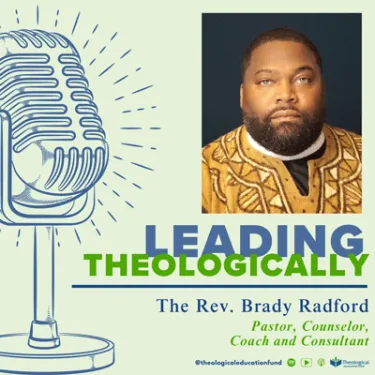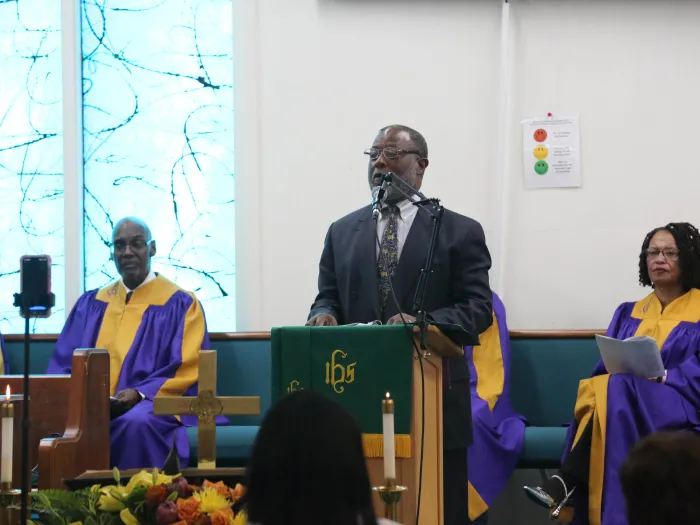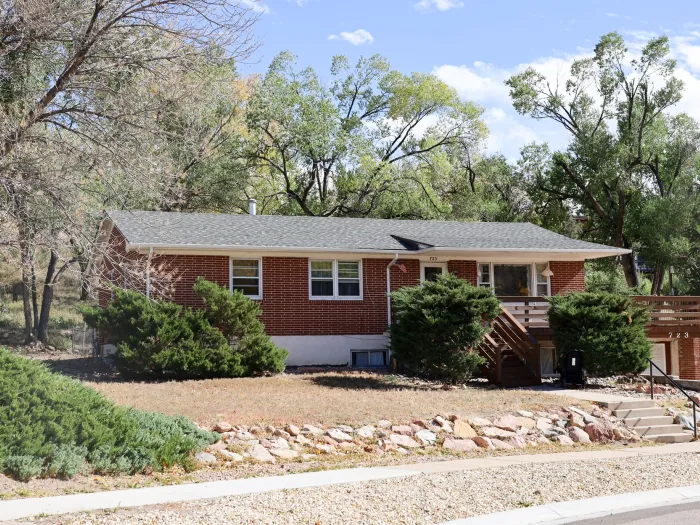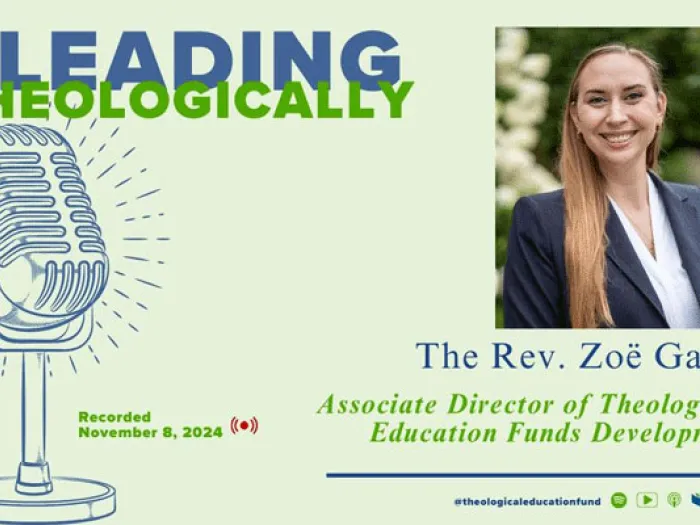Like Samson did with the donkey’s jawbone, we can put down tools that are no longer needed
The Rev. Brady Radford discusses transitional ministry on ‘Leading Theologically’


LOUISVILLE — Pastors receiving training from the PC(USA)’s Transitional Ministry Education Consortium learn one thing from the get-go: All ministry is transitional ministry.
“Those people who join us for transitional ministry training are not only navigating churches who are between pastoral leaders, but also called pastoral leaders who might consider having a week to think about the varied implications for navigating congregations through seasons of transition,” the Rev. Brady Radford, a pastor, counselor, coach and consultant from Atlanta, said during the most recent edition of Leading Theologically, which can be viewed ">here.
“We’re really inviting participants and faculty leaders to a deep and fulfilling conversation about serving the church in times of transition,” Radford told the host of “Leading Theologically,” the Rev. Bill Davis, Senior Director for Theological Education Funds Development at the Presbyterian Foundation. “We help leaders hold non-anxious space in the midst of transitional seasons.”
Davis recalled his own training in transitional ministry, which occurred about 15 years ago at the Calvin Center in Atlanta. “Some of those tools have been vital as I’ve helped congregations navigate the way forward for them,” Davis said. “I love the way you named that all ministry is transitional.”
“In as much as all ministry is transitional ministry, it’s important for us to know we are beyond the days of ‘set it and forget it,’” Radford said. “Carbon copy or cookie cutter plans and programs are not as likely to be effective today. … Our congregations and our members have access to so much information that it’s far bigger than having a singular vision or a singular program to invite people to plug into. It really becomes somewhat of a balancing act that requires quite a bit of tending, and the language of ‘tending’ looks at how we are paying attention to the contours of what’s changing.”
Among the changes are around people dynamics and resources, including church properties. “Buildings are going to become a huge conversation for most of our ministries in major cities over the next 5-10 years, and maybe sooner than that,” Radford said.

Before coming to the Presbyterian Foundation, Davis spent two years as an intentional transitional pastor of two Denver-area congregations that were merging. “Part of what I want to name is there are definite intentional times where we as pastors can invite congregations to think intently about the things that they need to let go of in order to move forward faithfully, whether that’s through a merger or through redefining ministry,” Davis said. “I know our denomination has plenty of great programs that invite us to consider how to do that faithfully.”
Radford said many churches are “answering the question of who we are and how do we faithfully live into the call to be new and to be different in this day and age.” At the heart of that faithfulness is the tradition to be “the church Reformed, always reforming.”
“We say that, but how do we live it into existence?” Radford asked. “Even if it means praising God and thanking God for what has been in this location and time, as we follow God faithfully into the next iteration of ministry that comes forth — whether it be through merger or the ending of a congregation and the seeding of a new worshiping community or congregation — I think there are many ways to be faithful during ministries of transition.”
Davis pointed out that commissioners at the 226th General Assembly (2024) approved the election of five presidents at PC(USA)-affiliated seminaries. “Part of that joyous celebration of confirmation is the centering of non-white voices,” Davis said. One new president is a white male, and another is a white female. Three are people of color, and on Sept. 3, the Rev. Dr. Maisha I. Handy began work as the 12th president of McCormick Theological Seminary, the seminary’s first African American president. “I think that’s a great movement of the Spirit we can celebrate as we think about how future leaders of the church are being educated,” Davis said.
He then asked Radford about his work during General Assembly helping to create places of respite for Black, Indigenous and People of Color and for members of the LGBTQIA+ community to gather.
Radford called the spaces that were created places to “release some of the pressures and tensions that come from being in such a large assembly. Many BIPOC leaders are there for the first time. To see the inner workings of the church on such a large scale can be overwhelming. Having a respite space reminds you that you’re here because God called you here — not because someone permitted you to be here. You belong here. You’re here because you have something to offer, something to give.”
“May I say a word of thanks to the planners and conveners of General Assembly who were intentional in terms of thinking through the opportunity to provide space for all God’s children to have the opportunity to be present and to be well, and to be supported,” Radford said.
Davis concluded the nearly 20-minute conversation by asking Radford about the best thing he’s heard recently. Radford cited a clip of the late Myles Munroe, a Bahamian minister and preacher “who was a mentor for so many.” During ">this brief clip, Munroe discusses the jawbone of the donkey Samson used to kill a thousand Philistines. “At some point,” Radford said, quoting Munroe, “Samson put the tool down. He discarded the thing that had worked so well,” an act that gives us “fresh insight into what can become a hindrance for some of us in ministry. We love to set it and forget it. We love to find good tools, and if it’s worked, we assume it will always work.”
“After the season is up, it may be time for us to set some of those tools aside. It’s a level of maturity and dexterity,” Radford said. “There are ways of ministry that have worked well for us, but there might also be some forms of ministry — some resources for ministry — that it’s time to say, ‘Thank you, Lord, for this gift, this tool,’ and to put it down as we open our hands and allow what’s meant to come next to emerge.”
“I love that metaphor of setting the jawbone aside,” Davis said, thanking Radford for joining the conversation. “Thank you for that good word, my friend, and for this lovely conversation today,” Davis said. “I am appreciative of your ministry and your work.”
Previous “Leading Theologically” conversations may be found here.
You may freely reuse and distribute this article in its entirety for non-commercial purposes in any medium. Please include author attribution, photography credits, and a link to the original article. This work is licensed under a Creative Commons Attribution-NonCommercial-NoDeratives 4.0 International License.




